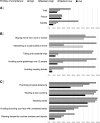Association between level of compliance with COVID-19 public health measures and depressive symptoms: A cross-sectional survey of young adults in Canada and France
- PMID: 37531389
- PMCID: PMC10395933
- DOI: 10.1371/journal.pone.0289547
Association between level of compliance with COVID-19 public health measures and depressive symptoms: A cross-sectional survey of young adults in Canada and France
Abstract
Background: While compliance with preventive measures remains central to limit the spread of COVID-19, these measures critically affected mental health of young adults. We therefore investigated the association between the level of compliance with COVID-19 preventive measures and depressive symptoms among young adults in Canada and France.
Methods: From October to December 2020, we conducted a cross-sectional online survey of young adults ages 18-29 years in Canada (n = 3246) and France (n = 2680) to collect demographic data, experiences with COVID-19 preventive measures, and mental health. Depressive symptoms were assessed by the Patient Health Questionnaire-9 (PHQ-9). Compliance profiles were built using cluster analysis. Weighted multivariable logistic regression was used to estimate associations between compliance level and major depressive symptoms (PHQ-9 score≥15) in each country.
Results: One third of respondents reported major depressive symptoms (Canada: 36.4%, France: 23.4%). Four compliance profiles were identified: high (42.5%), medium-high (21.7%), medium-low (18.1%), and low (17.7%), with high levels more frequently observed in Canada compared to France. In both countries, participants in low compliance profile (Canada: Adjusted Odds Ratio (AOR) [95% Confidence Interval] 0.75 [0.58, 0.98], France: AOR 0.60 [0.46, 0.75]), in the medium-low (Canada: AOR 0.58 [0.48, 0.72], France: AOR 0.81 [0.66, 1.01]), and medium-high compliance profiles (Canada: AOR 0.78 [0.65, 0.93], France: AOR 0.77 [0.63, 0.93]) were less likely to report major depressive symptoms compared to the high compliance profile. Ethno-racial minorities, sexual and gender minority, and unemployed young adults had higher odds of reporting such symptoms.
Conclusions: Major depressive symptoms were associated with high compliance with COVID-19 preventive measures among young adults. The implementation of socially-isolating measures should be coupled with mental health interventions to address mental health needs of young adults, with enhanced supports for sub-groups who are structurally disadvantaged (e.g., racialized, unemployed, sexual and gender minority).
Copyright: © 2023 Coulaud et al. This is an open access article distributed under the terms of the Creative Commons Attribution License, which permits unrestricted use, distribution, and reproduction in any medium, provided the original author and source are credited.
Conflict of interest statement
The authors have declared that no competing interests exist.
Figures
References
-
- World Health Organization. Coronavirus disease (COVID-19) advice for the public [Internet]. 2020. [cited 2021 Aug 29]. Available from: https://www.who.int/emergencies/diseases/novel-coronavirus-2019/advice-f...
-
- Hartley DM, Perencevich EN. Public Health Interventions for COVID-19: Emerging Evidence and Implications for an Evolving Public Health Crisis. Vol. 323, JAMA—Journal of the American Medical Association. American Medical Association; 2020. p. 1908–9. - PubMed
Publication types
MeSH terms
Grants and funding
LinkOut - more resources
Full Text Sources
Medical


